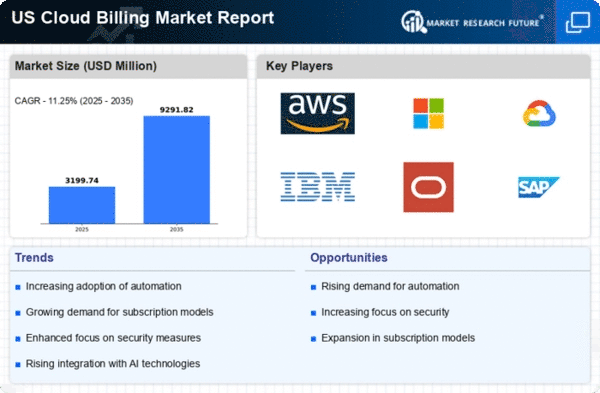Rising Adoption of Cloud Solutions
The cloud billing market is experiencing a notable surge in adoption as businesses increasingly migrate to cloud-based solutions. This shift is driven by the need for flexibility, scalability, and cost-effectiveness. According to recent data, approximately 70% of organizations in the US have adopted some form of cloud service, which directly influences the demand for cloud billing solutions. As companies seek to optimize their billing processes, the cloud billing market is poised for growth. The ability to manage billing in real-time and automate invoicing processes enhances operational efficiency, making cloud billing an attractive option for businesses of all sizes. Furthermore, the integration of cloud solutions allows for seamless updates and maintenance, reducing the burden on IT departments. This trend indicates a robust future for the cloud billing market as more organizations recognize the benefits of cloud technology.
Increased Focus on Customer Experience
In the cloud billing market, there is a growing emphasis on enhancing customer experience through improved billing processes. Companies are recognizing that a seamless billing experience can significantly impact customer retention and satisfaction. Recent surveys indicate that nearly 75% of consumers in the US prefer transparent and straightforward billing practices. This trend is prompting cloud billing market players to invest in user-friendly interfaces and personalized billing solutions. By leveraging technology to simplify billing, companies can foster stronger relationships with their customers. Additionally, the integration of customer feedback into billing systems allows for continuous improvement, ensuring that services meet evolving customer expectations. As businesses prioritize customer experience, the cloud billing market is likely to see increased competition among providers striving to offer the most efficient and user-centric solutions.
Emergence of Usage-Based Billing Models
The cloud billing market is witnessing a shift towards usage-based billing models, which align costs with actual consumption. This approach allows businesses to pay only for the resources they utilize, making it particularly appealing in a landscape where cost management is critical. Recent studies suggest that around 60% of companies in the US are exploring or implementing usage-based billing strategies. This trend is likely to drive innovation within the cloud billing market, as providers develop more sophisticated billing systems that can accurately track and report usage metrics. The flexibility offered by usage-based models not only enhances customer satisfaction but also encourages businesses to scale their operations without the fear of incurring excessive costs. As this model gains traction, it could reshape pricing strategies across the cloud billing market.
Regulatory Compliance and Data Security
The cloud billing market is increasingly influenced by the need for regulatory compliance and data security. As businesses handle sensitive financial information, adherence to regulations such as the General Data Protection Regulation (GDPR) and the Payment Card Industry Data Security Standard (PCI DSS) becomes paramount. In the US, approximately 80% of organizations are prioritizing compliance measures, which directly impacts their choice of cloud billing solutions. This trend is driving cloud billing market providers to enhance their security features and ensure that their systems are compliant with relevant regulations. The focus on data protection not only mitigates risks but also builds trust with customers, who are becoming more aware of data privacy issues. As regulatory landscapes evolve, the demand for compliant cloud billing solutions is expected to grow, shaping the future of the market.
Technological Advancements in Billing Solutions
Technological advancements are playing a crucial role in shaping the cloud billing market. Innovations such as artificial intelligence (AI), machine learning, and blockchain are being integrated into billing systems, enhancing accuracy and efficiency. For instance, AI-driven analytics can provide insights into billing patterns, enabling businesses to optimize their pricing strategies. Recent reports indicate that the adoption of AI in billing processes could increase operational efficiency by up to 40%. This trend suggests that the cloud billing market is on the brink of a technological revolution, where automation and intelligent systems redefine traditional billing practices. As companies seek to leverage these advancements, the demand for sophisticated cloud billing solutions is likely to rise, fostering a competitive landscape among providers. The integration of cutting-edge technology not only streamlines operations but also positions businesses to adapt to future market changes.
















